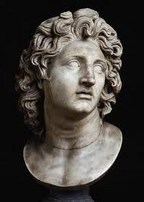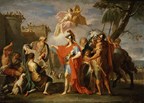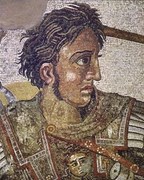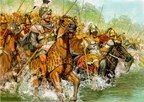Many documentaries, historic books, articles, history scientists and others have concerned their selves to learn about Alexander the Great. Doubtless is one of the greatest marshals of the global history and surely a very controversial personality. He was born in 356BC in Pella of Macedonia in Northern Greece and he was the son of the King Philipp II and Olympias. Alexander became king at the age of 20. Many writers present him as a warlike and bloodthirsty commander, others as the man who civilized the barbarians or as the first ecumenist in the human history. At the age of 30, Alexander ruled one of the greatest empires in the entire world. From the Greek olive groves to the palaces of India, he joined the East with the West and changed the ancient world forever.
Alexander’s father, the King Philipp with diplomacy and overt violence, conquered almost the whole Greece. It’s sure that Alexander took the military and leadership skills from his father. His mother, Olympias was a dynamic and mysterious woman. She was so impressive and imposing, as much as her husband. He was highly intelligent, had an acute political crisis and was hard as steel. Also she was very possessive with her son. Undoubtedly loved him deeply and guarded his interests watchfully. Olympias spread the rumor that Zeus, the Olympian king of gods, had left her pregnant, disguised as a snake. Throughout his life, Alexander was fascinated by the thought that maybe he was something more than a common mortal man. Huge was also the influence of his teacher, the famous Greek philosopher, Aristotle. Through him, Alexander was initiated into the wonders of the Greek culture, particularly in Greek mythology. Aristotle’s breathed him the love for the Iliad, the story of the Trojan War. Alexander left the palace to study with Aristotle for three years. In the Iliad, the heroes of the epic strength and deeds earn power and glory. One of these heroes is Achilles, the archetypal Greek warrior and idol for the young Alexander as he wanted to be like him, the first of all.
Alexander as King
When Alexander was 20 years old, his father Philipp was murdered so he became the next Macedonian King. When he took the throne, the heritage of Alexander was a large army but also an equally large political instability. It had to pass a year to quell a revolt in Greece and consolidate his power. For Alexander, however, Macedonia was not enough. His impatience and ambition made him hungry for more. The target was the old enemy of the Greeks, the Persians. The Persian Empire was stretched from Asia Minor to Pakistan. 150 years ago, the Persians had set fire in Athens and had destroyed the temples. This war crime had never been forgotten. Before been murdered Alexander’s father, Philipp, planned to invade Persia so it was the turn of Alexander to get revenge.
In 334BC, Alexander started his 11-year long journey of conquests and ambitions in Asia. His first stop was in the ramshackle walls of Troy, for worship to his hero of childhood, Achilles. Alexander was preparing for his epic battle and his opponent was one of the richest and most powerful men on earth, the King Darius III the Persian. Although, the young Macedonian king had two very effective allies: one of the best trained and disciplined armies of the ancient world and his military genius. Also, he had a great adaptability which was helping him to perceive each one situation and to find a plan to overcome obstacles which were impossible to handle by other leaders.
The Battle of the Granicus River
In the spring of 334BC, over 130.000 Persians were waiting for Alexander at the Granicus River with their leaders Mithridates and Spithridates. There took place the first battle and the first win of Alexander which had some good effects for the rest invasion: at first, the position of Alexander was strengthened and the material needs were ensured, also the Macedonians got courage and self-confidence to continue to fight and finally, the entire Asia Minor became a Greek territory.
Alexander in Egypt
After a series of violent victories, Alexander is ready to conquer Egypt, one of the greatest empires which had been created ever. The Egyptian pharaohs were considered as living gods and built huge pyramids, temples and monuments which were witnessing their glory. After two years of war, Alexander marches in the interior country, in Memphis. Egyptians were eager to see the disaster of the Persian conquerors. They were surrendered without a fight and recognized Alexander as their liberator. Because Alexander respected the religious and traditional habits of the Egyptians, their priests gave to him the title of Pharaoh and Alexander started to believe that really was a living god. Although, the conquest of Egypt was a strategic victory as was achieved to cut off Persia by sea.
The Battle of Gaugamela
This battle took place in October of 331BC and decided the fate of the entire Persian Empire. Alexander was at an arithmetical disadvantage of soldiers so the challenge was huge. His Macedonian phalanx broke through the army of Darius who left the battle. Darius, who went to the eastern mountains, was assassinated. Three years after his worship in Troy, Alexander was proclaimed as the lord of Asia.
Alexander in India
The Macedonian king and the heir of the Persian Empire decided to go and conquest India. When he reached there everything was very mysterious and unfamiliar to him. The Indians had collected 50.000 men and in addition they afforded a terrible weapon: 200 war elephants! With a height of 3 meters and a weight of 5.000 kilogrammes, the elephants were the tanks of the antiquity as they could attack frontally and trample the enemy. Despite the difficulties, after one of the hardest battles in history, the Indian army decimated and the Maharaja surrendered. Alexander, impressed by the braveness of the Maharaja with an unexpected move, returned his kingdom back to him. The legend of Alexander has deep roots in the Indian historic consciousness. We can recognize his influence in the Indian literature, sculpture and painting until our modern days. Even today, at the North-western areas of India, we can see sculptured Indian gods inspired by the ancient Greek art.
Alexander’s return in Babylon and his death
After 8 years of war and 27.000 kilometres of walking, the Greek army was ready to be disbanded. The rainfalls during the monsoons, the deserts and the hot sun affected terribly the physical and mental situation of the soldiers who refused to continue. Alexander decided to return to the capital of the Persian Empire Babylon, but during this epic journey less than 1/3 of his men had survived. In Babylon, during a hot night of May in 323BC, after a big wine drinking, Alexander got mysteriously sick. He was burning by a high fever and his health was in emergency. After 30.000 kilometres of bloodshed and conquests, the hunting of the immortal glory came to its end. At the end of the 11 days fever, Alexander, one of the greatest generals and leaders of the world, died at the age of 32. There are a lot conflicted opinions about the reason of his death although malaria is the most acceptable.
The art of war is only one aspect of the heritage of Alexander. He also created new trade routes and forged cultural relations between East and West. Alexander popularized the Greek culture. Thus, the Greek tragedies are played in today’s Iran and Greek philosophy finally arrives through India to Sri Lanka. However, above all, he is considered as one of the most gifted military leaders who have ever lived. His braveness, his fearless character and his loyalty made him an irresistible hero. Alexander the Great was a legendary leader who had an obsession with his own myth. 2.500 years later, we are still talking about his amazing achievements. Alexander the Great achieved that he wanted most of all: immortal glory.




